Abstract
OBJECTIVE: This Belgian study assessed the geographical and temporal differences in the exposure of the population to inorganic arsenic, a known carcinogen. METHODS: In the CadmiBel study (1985-9) the 24 h urinary arsenic excretion was measured, as an index of recent exposure, in industrialised cities (Liège: n = 664, Charleroi: n = 291), in a rural control area (Hechtel-Eksel: n = 397), and in rural districts in which the population had possibly been exposed through the drinking water or the emissions of nonferrous smelters (Wezel: n = 93, Lommel: n = 111, and Pelt: n = 133). In the PheeCad study, in 1991-5, the rural areas (n = 609) were re-examined together with an urban control area (Leuven: n = 152). RESULTS: The CadmiBel results showed that after adjustment for sex, age, and body mass index, the 24 h arsenic excretion was on average low in Liège (91 nmol), Charleroi (155 nmol), Hechtel-Eksel (144 nmol), and Wezel (158 nmol), whereas the highest excretions were found in Lommel (570 nmol) and Pelt (373 nmol). During the PheeCad study, the mean 24 h arsenic excretion in the rural areas ranged from 81 to 111 nmol. This was lower than six years earlier and similar to the excretion in the control town (108 nmol). Longitudinal studies in 529 people living in the rural areas confirmed that their 24 h arsenic excretion had decreased (P < 0.001) from 222 to 100 nmol. As well as the drinking water, industry was likely to be a source of the increased exposure in Lommel and Pelt in 1985-9, because at that time the urinary arsenic excretion did not follow the regional differences in the arsenic content of the drinking water, because the fall in the arsenic excretion over time coincided with the implementation by industry of stricter environmental regulations, because in individual subjects the urinary arsenic excretion was inversely correlated with the distance to the nearest smelter, and because an increased arsenic excretion was only found downwind from the main smelter. The official network that monitors the arsenic concentration in airborne and fall out dust did not detect the high exposure in Lommel and Pelt between 1985 and 1989. CONCLUSION: This study highlights the necessity to validate environmental monitoring programmes by directly estimating the internal exposure of the population.
Full text
PDF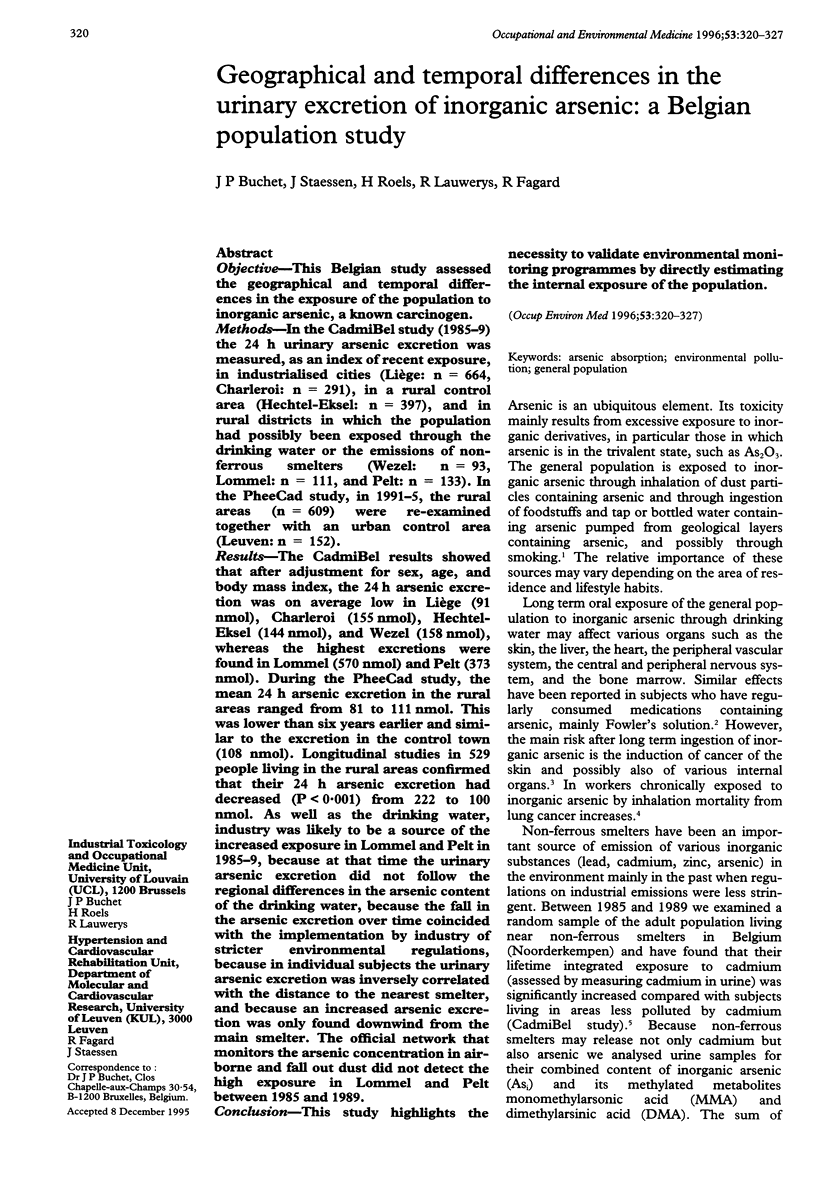
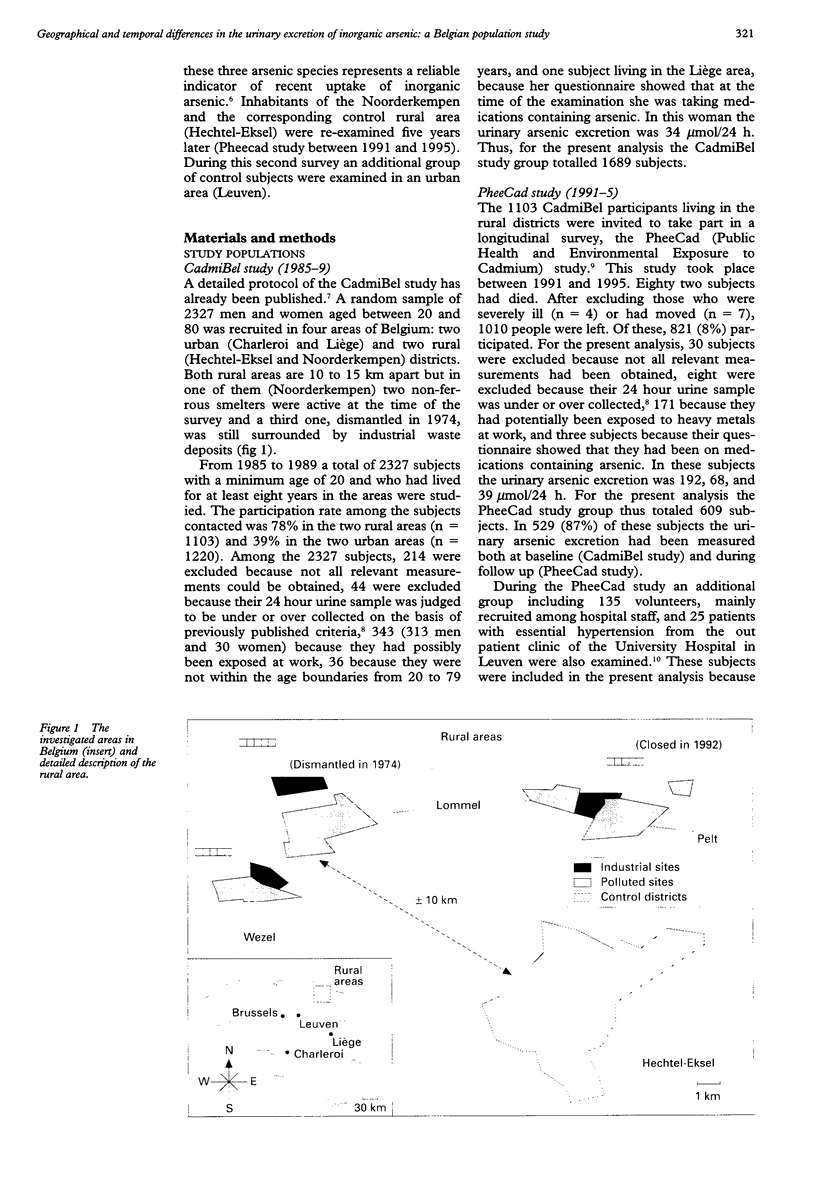
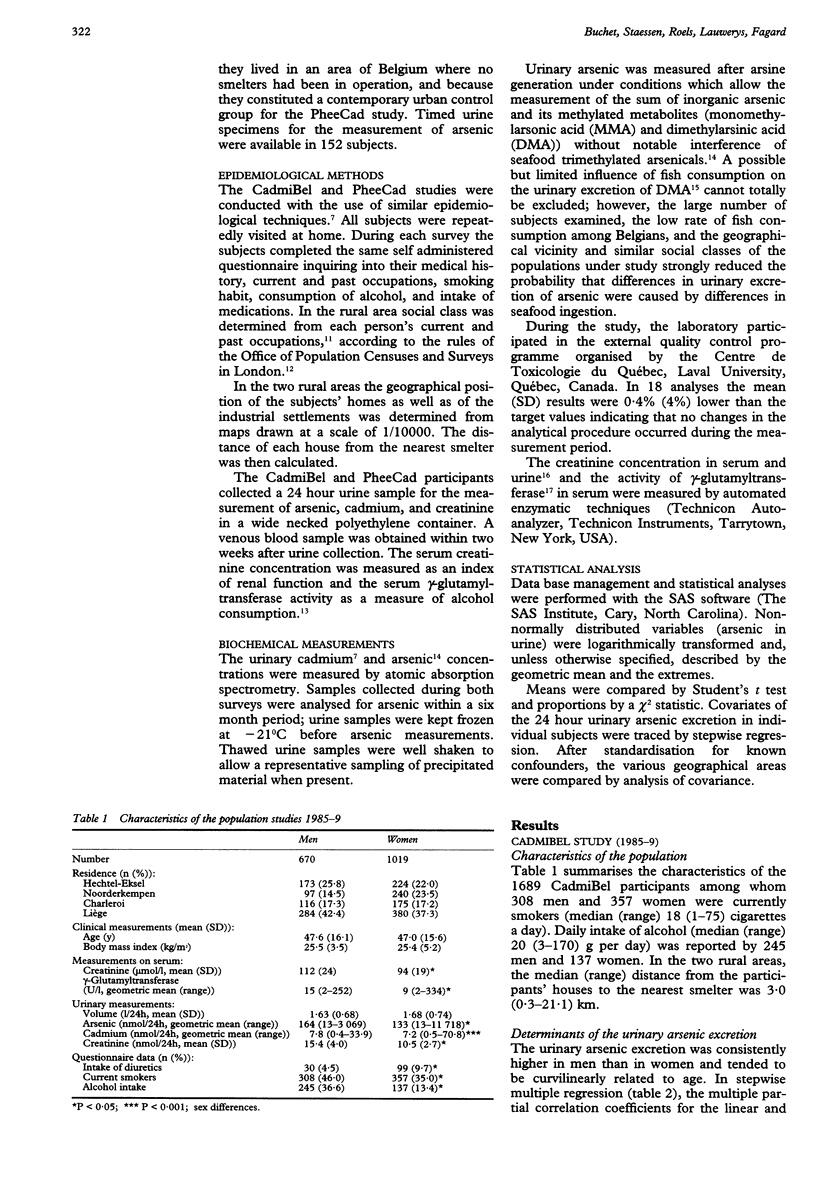
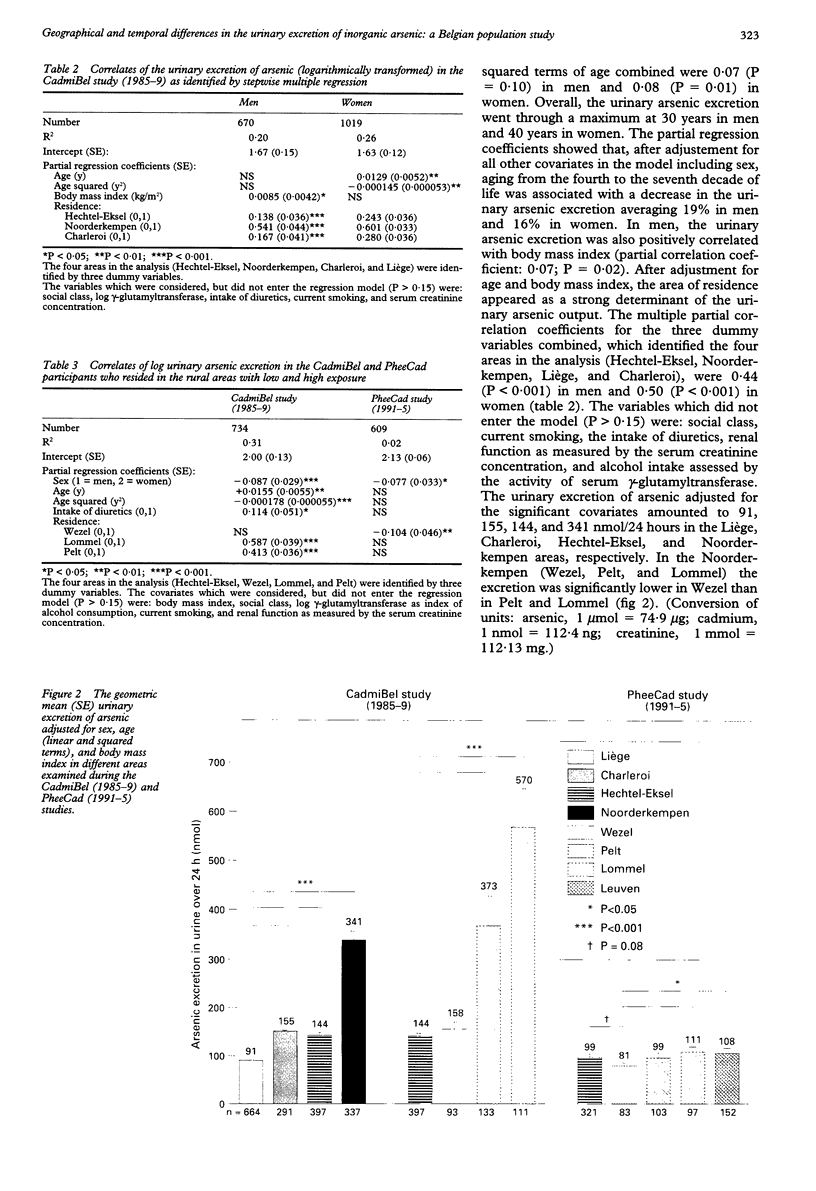
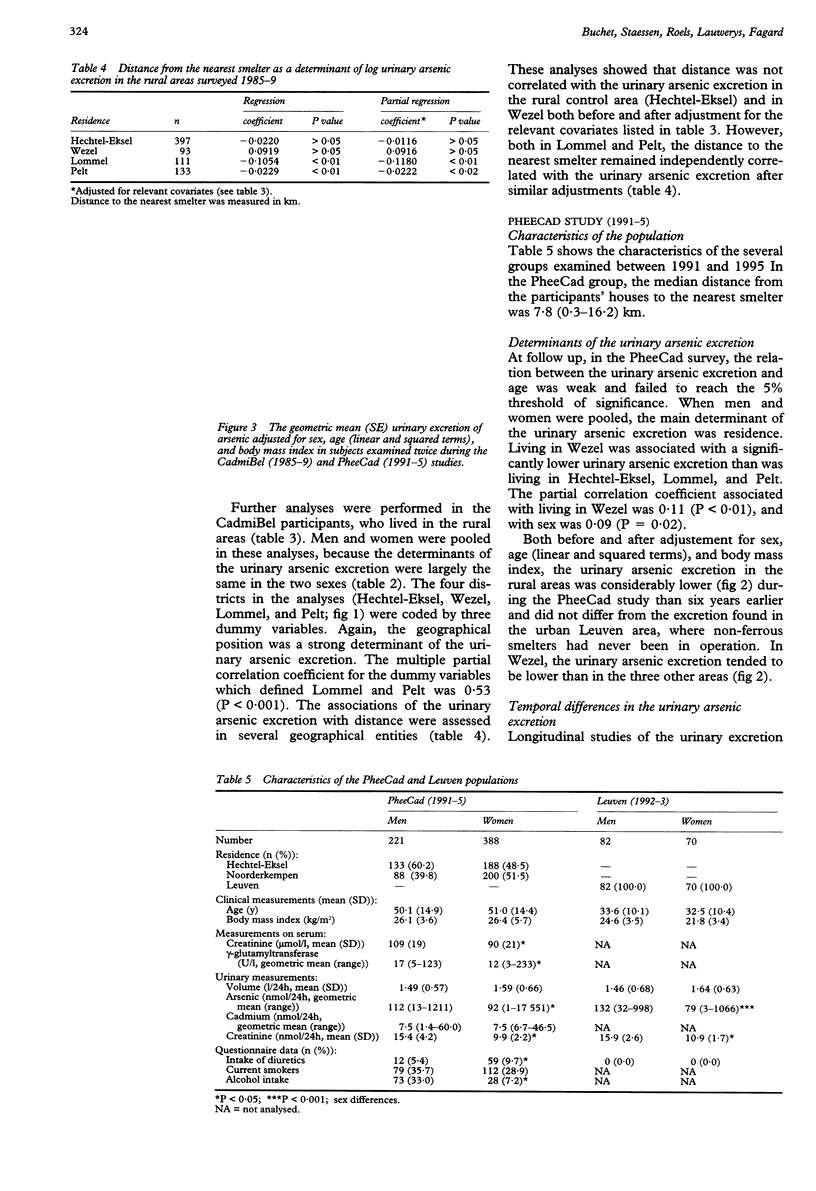
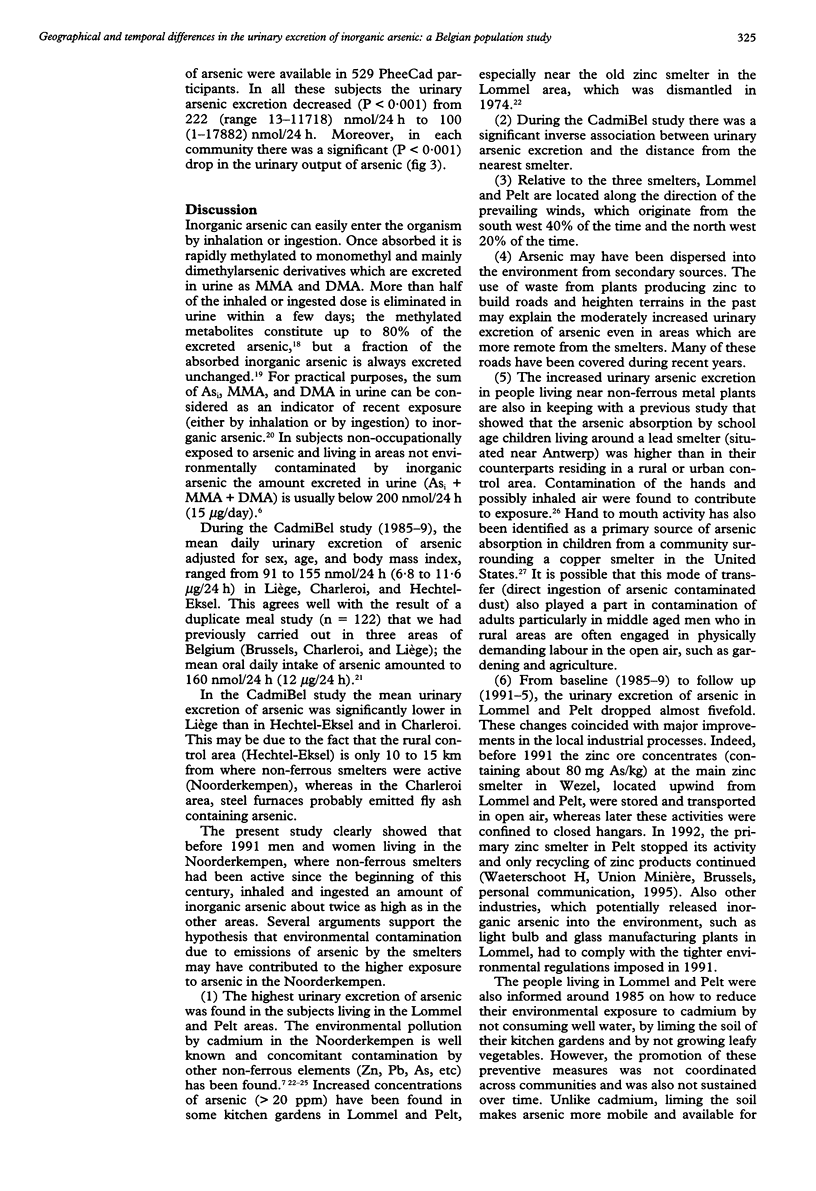
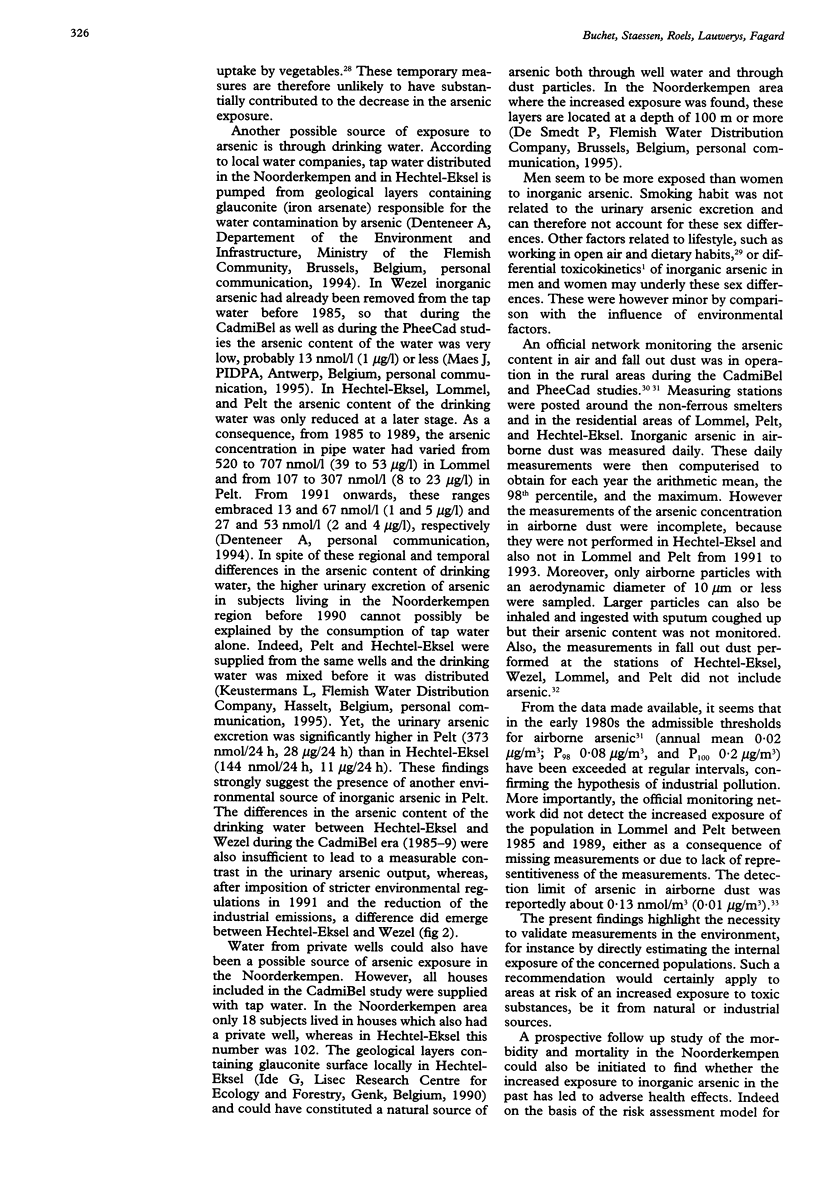
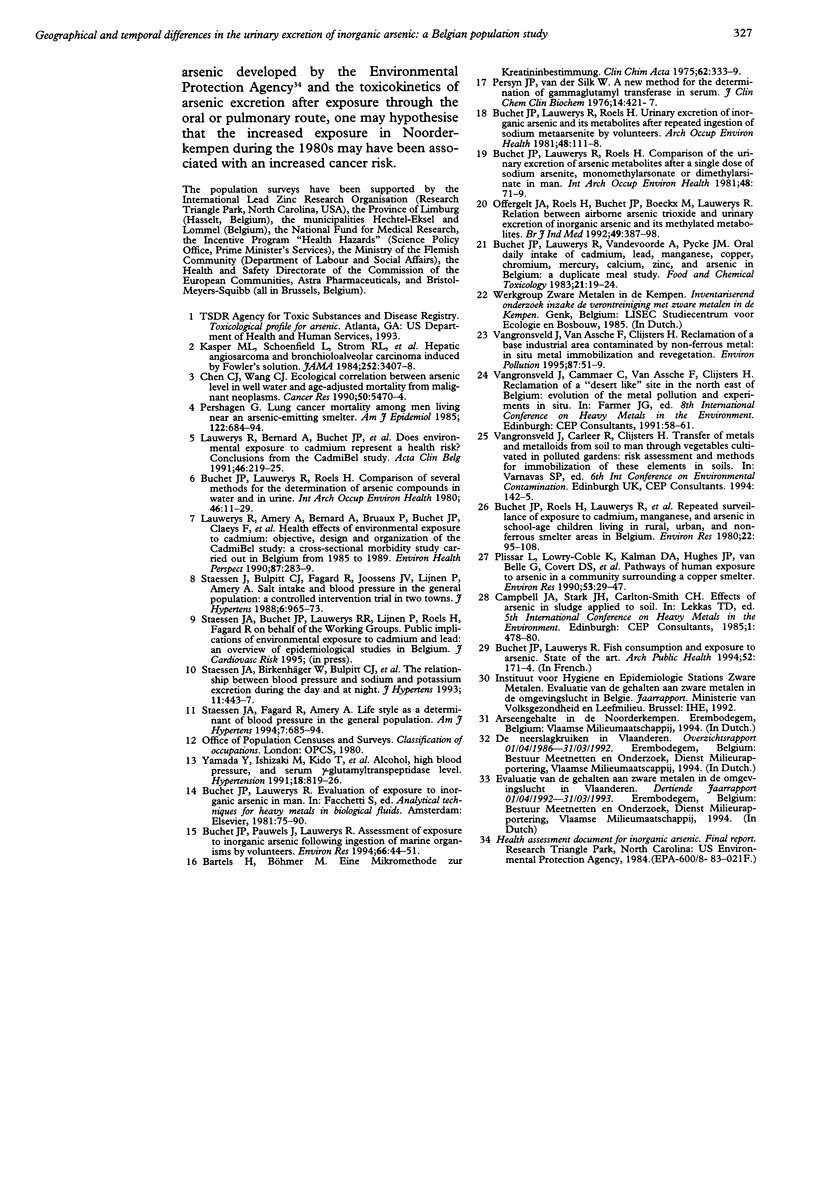
Selected References
These references are in PubMed. This may not be the complete list of references from this article.
- Buchet J. P., Lauwerys R., Roels H. Comparison of several methods for the determination of arsenic compounds in water and in urine. Their application for the study of arsenic metabolism and for the monitoring of workers exposed to arsenic. Int Arch Occup Environ Health. 1980;46(1):11–29. doi: 10.1007/BF00377456. [DOI] [PubMed] [Google Scholar]
- Buchet J. P., Lauwerys R., Roels H. Comparison of the urinary excretion of arsenic metabolites after a single oral dose of sodium arsenite, monomethylarsonate, or dimethylarsinate in man. Int Arch Occup Environ Health. 1981;48(1):71–79. doi: 10.1007/BF00405933. [DOI] [PubMed] [Google Scholar]
- Buchet J. P., Lauwerys R., Roels H. Urinary excretion of inorganic arsenic and its metabolites after repeated ingestion of sodium metaarsenite by volunteers. Int Arch Occup Environ Health. 1981;48(2):111–118. doi: 10.1007/BF00378431. [DOI] [PubMed] [Google Scholar]
- Buchet J. P., Lauwerys R., Vandevoorde A., Pycke J. M. Oral daily intake of cadmium, lead, manganese, copper, chromium, mercury, calcium, zinc and arsenic in Belgium: a duplicate meal study. Food Chem Toxicol. 1983 Feb;21(1):19–24. doi: 10.1016/0278-6915(83)90263-6. [DOI] [PubMed] [Google Scholar]
- Buchet J. P., Pauwels J., Lauwerys R. Assessment of exposure to inorganic arsenic following ingestion of marine organisms by volunteers. Environ Res. 1994 Jul;66(1):44–51. doi: 10.1006/enrs.1994.1043. [DOI] [PubMed] [Google Scholar]
- Buchet J. P., Roels H., Lauwerys R., Bruaux P., Claeys-Thoreau F., Lafontaine A., Verduyn G. Repeated surveillance of exposure to cadmium, manganese, and arsenic in school-age children living in rural, urban, and nonferrous smelter areas in Belgium. Environ Res. 1980 Jun;22(1):95–108. doi: 10.1016/0013-9351(80)90122-x. [DOI] [PubMed] [Google Scholar]
- Chen C. J., Wang C. J. Ecological correlation between arsenic level in well water and age-adjusted mortality from malignant neoplasms. Cancer Res. 1990 Sep 1;50(17):5470–5474. [PubMed] [Google Scholar]
- Kasper M. L., Schoenfield L., Strom R. L., Theologides A. Hepatic angiosarcoma and bronchioloalveolar carcinoma induced by Fowler's solution. JAMA. 1984 Dec 28;252(24):3407–3408. [PubMed] [Google Scholar]
- Lauwerys R., Amery A., Bernard A., Bruaux P., Buchet J. P., Claeys F., De Plaen P., Ducoffre G., Fagard R., Lijnen P. Health effects of environmental exposure to cadmium: objectives, design and organization of the Cadmibel Study: a cross-sectional morbidity study carried out in Belgium from 1985 to 1989. Environ Health Perspect. 1990 Jul;87:283–289. doi: 10.1289/ehp.9087283. [DOI] [PMC free article] [PubMed] [Google Scholar]
- Lauwerys R., Bernard A., Buchet J. P., Roels H., Bruaux P., Claeys F., Ducoffre G., De Plaen P., Staessen J., Amery A. Does environmental exposure to cadmium represent a health risk? Conclusions from the Cadmibel study. Acta Clin Belg. 1991;46(4):219–225. doi: 10.1080/17843286.1991.11718168. [DOI] [PubMed] [Google Scholar]
- Offergelt J. A., Roels H., Buchet J. P., Boeckx M., Lauwerys R. Relation between airborne arsenic trioxide and urinary excretion of inorganic arsenic and its methylated metabolites. Br J Ind Med. 1992 Jun;49(6):387–393. doi: 10.1136/oem.49.6.387. [DOI] [PMC free article] [PubMed] [Google Scholar]
- Pershagen G. Lung cancer mortality among men living near an arsenic-emitting smelter. Am J Epidemiol. 1985 Oct;122(4):684–694. doi: 10.1093/oxfordjournals.aje.a114147. [DOI] [PubMed] [Google Scholar]
- Persijn J. P., van der Slik W. A new method for the determination of gamma-glutamyltransferase in serum. J Clin Chem Clin Biochem. 1976 Sep;14(9):421–427. doi: 10.1515/cclm.1976.14.1-12.421. [DOI] [PubMed] [Google Scholar]
- Polissar L., Lowry-Coble K., Kalman D. A., Hughes J. P., van Belle G., Covert D. S., Burbacher T. M., Bolgiano D., Mottet N. K. Pathways of human exposure to arsenic in a community surrounding a copper smelter. Environ Res. 1990 Oct;53(1):29–47. doi: 10.1016/s0013-9351(05)80128-8. [DOI] [PubMed] [Google Scholar]
- Staessen J. A., Birkenhäger W., Bulpitt C. J., Fagard R., Fletcher A. E., Lijnen P., Thijs L., Amery A. The relationship between blood pressure and sodium and potassium excretion during the day and at night. J Hypertens. 1993 Apr;11(4):443–447. doi: 10.1097/00004872-199304000-00016. [DOI] [PubMed] [Google Scholar]
- Staessen J. A., Fagard R., Amery A. Life style as a determinant of blood pressure in the general population. Am J Hypertens. 1994 Aug;7(8):685–694. doi: 10.1093/ajh/7.8.685. [DOI] [PubMed] [Google Scholar]
- Staessen J., Bulpitt C. J., Fagard R., Joossens J. V., Lijnen P., Amery A. Salt intake and blood pressure in the general population: a controlled intervention trial in two towns. J Hypertens. 1988 Dec;6(12):965–973. doi: 10.1097/00004872-198812000-00003. [DOI] [PubMed] [Google Scholar]
- Tucker S. M., Boyd P. J., Thompson A. E., Price R. G. Automated assay of N-acetyl-beta-glucosaminidase in normal and pathological human urine. Clin Chim Acta. 1975 Jul 23;62(2):333–339. doi: 10.1016/0009-8981(75)90245-4. [DOI] [PubMed] [Google Scholar]
- Vangronsveld J., Van Assche F., Clijsters H. Reclamation of a bare industrial area contaminated by non-ferrous metals: in situ metal immobilization and revegetation. Environ Pollut. 1995;87(1):51–59. doi: 10.1016/s0269-7491(99)80007-4. [DOI] [PubMed] [Google Scholar]
- Yamada Y., Ishizaki M., Kido T., Honda R., Tsuritani I., Ikai E., Yamaya H. Alcohol, high blood pressure, and serum gamma-glutamyl transpeptidase level. Hypertension. 1991 Dec;18(6):819–826. doi: 10.1161/01.hyp.18.6.819. [DOI] [PubMed] [Google Scholar]


